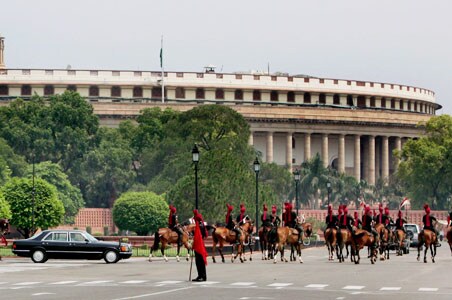
New Delhi:
The Winter Session of Parliament has failed to conduct any business since the month-long session began on November 19 as it was adjourned over the controversial Sugar Control Ordinance for two days and on Liberhan issue on Monday.
The 33-day session of Parliament is scheduled to conclude on December 21.
India loses nearly Rs 20,000 (about $400) every minute when politicians stall proceedings in Parliament.
A non-governmental organisation National Social Watch Coalition had published a report titled 'Citizens Report on Governance and Development - 2006.' The study came with the following findings.
• It has has found that between 1951 and 2003-2004, the cost of running the two Houses of Parliament registered an increase from Rs 100 per minute to Rs 18,430 per minute. That figure is now estimated to have reached Rs 20,000 per minute.
• The previous (14th) Lok Sabha recorded 38 per cent time lost in the first two sessions, because of the row over the induction of 'tainted' members of Parliament into the UPA government and the absence of 'absconding' minister Shibu Soren.
• The Rajya Sabha, reacting similarly to these issues, lost a whopping 46 per cent time in the corresponding 201st and 202nd sessions.
• The study has also found that in the 11th Lok Sabha (1996 to 1998) 5.28 per cent of the total Parliament time was lost in pandemonium. The figure increased to 10.66 per cent in the 12th Lok Sabha and more than doubled to 22.4 per cent between 1999 and 2004.
The present parliamentary session has to transact several business. The Lok Sabha has to pass six Bills in this session. These are:
• Rubber (Amendment) Bill, 2009
• National Green Tribunal Bill, 2009
• National Commission for Minorities Educational Institutions (Amendment) Bill, 2009 Workmen's Compensation (Amendment) Bill, 2009
• Employees' State Insurance (Amendment) Bill, 2009
• Land Ports Authority of India Bill, 2009
The Rajya Sabha has ten Bills pending before it. These are:
• The Seeds Bill, 2004.
• The Pesticides Management Bill, 2008.
• The Legal Metrology Bill, 2008.
• The National Commission for Heritage Sites Bill, 2009.
• The Labour Laws (Exemption from Furnishing Returns and Maintaining Registers by Certain Establishments) Amendment and Miscellaneous Provisions Bill, 2005.
• The Representation of the People (Second Amendment) Bill, 2008.
• The Constitution (One Hundredth and Eighth Amendment) Bill, 2008.
• The Representation of the People (Amendment) Bill, 2006.
• The Mines and Minerals (Development and Regulation) Amendment Bill, 2008.
• The Communal Violence (Prevention, Control and Rehabilitation of Victims) Bill, 2005.
• The Foreign Contribution (Regulation) Bill, 2006.
• The Industrial Disputes (Amendment) Bill, 2009
• The Plantation Labour (Amendment) Bill, 2008
Each honourable member, who represents about 10-12 lakh (1-1.2 million) people, is wasting public money by stalling proceedings in Parliament.
The 33-day session of Parliament is scheduled to conclude on December 21.
India loses nearly Rs 20,000 (about $400) every minute when politicians stall proceedings in Parliament.
A non-governmental organisation National Social Watch Coalition had published a report titled 'Citizens Report on Governance and Development - 2006.' The study came with the following findings.
• It has has found that between 1951 and 2003-2004, the cost of running the two Houses of Parliament registered an increase from Rs 100 per minute to Rs 18,430 per minute. That figure is now estimated to have reached Rs 20,000 per minute.
• The previous (14th) Lok Sabha recorded 38 per cent time lost in the first two sessions, because of the row over the induction of 'tainted' members of Parliament into the UPA government and the absence of 'absconding' minister Shibu Soren.
• The Rajya Sabha, reacting similarly to these issues, lost a whopping 46 per cent time in the corresponding 201st and 202nd sessions.
• The study has also found that in the 11th Lok Sabha (1996 to 1998) 5.28 per cent of the total Parliament time was lost in pandemonium. The figure increased to 10.66 per cent in the 12th Lok Sabha and more than doubled to 22.4 per cent between 1999 and 2004.
The present parliamentary session has to transact several business. The Lok Sabha has to pass six Bills in this session. These are:
• Rubber (Amendment) Bill, 2009
• National Green Tribunal Bill, 2009
• National Commission for Minorities Educational Institutions (Amendment) Bill, 2009 Workmen's Compensation (Amendment) Bill, 2009
• Employees' State Insurance (Amendment) Bill, 2009
• Land Ports Authority of India Bill, 2009
The Rajya Sabha has ten Bills pending before it. These are:
• The Seeds Bill, 2004.
• The Pesticides Management Bill, 2008.
• The Legal Metrology Bill, 2008.
• The National Commission for Heritage Sites Bill, 2009.
• The Labour Laws (Exemption from Furnishing Returns and Maintaining Registers by Certain Establishments) Amendment and Miscellaneous Provisions Bill, 2005.
• The Representation of the People (Second Amendment) Bill, 2008.
• The Constitution (One Hundredth and Eighth Amendment) Bill, 2008.
• The Representation of the People (Amendment) Bill, 2006.
• The Mines and Minerals (Development and Regulation) Amendment Bill, 2008.
• The Communal Violence (Prevention, Control and Rehabilitation of Victims) Bill, 2005.
• The Foreign Contribution (Regulation) Bill, 2006.
• The Industrial Disputes (Amendment) Bill, 2009
• The Plantation Labour (Amendment) Bill, 2008
Each honourable member, who represents about 10-12 lakh (1-1.2 million) people, is wasting public money by stalling proceedings in Parliament.
Track Latest News Live on NDTV.com and get news updates from India and around the world

